

Identity Theory - Riverside Peter J. Burke Professor of Sociology University of California, Riverside Jan E. Stets Professor of Sociology University of California. Nsumer Culture and Postmodernism - Mike Featherstone. Marketing Semiotics: Signs, Strategies, and Brand Value - Laura R. Oswald, Laura Oswald. Intersubjectivity: The Fabric of Social Becoming - Nick Crossley. Consumerism: With Reference To Selected Home Appliances - V. Seshadri. Consumer Culture Theory.
The Future of Advertising Hinges on Understanding Identity. The word identity comes from the Latin word ident, meaning repeatedly, or again and again.
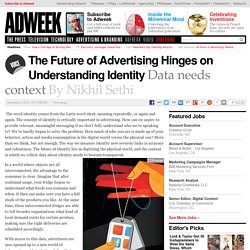
The concept of identity is critically important in advertising. How can we aspire to provide relevant, meaningful messaging if we don’t fully understand who we’re speaking to? We’ve hardly begun to solve the problem. How much of who you are is made up of your behavior, action and media consumption in the digital world versus the physical one?
More than we think, but not enough. In a world where objects are all interconnected, the advantage to the consumer is clear. With access to this data, advertisers are now opened up to a new world of information, able to better define their target audiences and deliver more relevant messaging to the right people. To some, this paints a scary picture. And with multiple log-ins, accounts and bits and pieces of information stored across a myriad of websites, can we really have a universal identity? It’ll be nice to finally really meet you. Restricted Access to Full Text. Journal of how consumer culture has changed. What Consumer Culture Will Look Like In 2020 (And How Brands Can Adapt) The global recession hasn’t changed our consumer culture all that much, but just wait a few years.
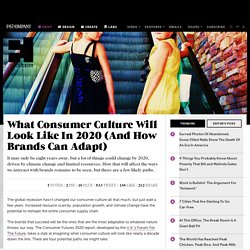
Increased resource scarcity, population growth, and climate change have the potential to reshape the entire consumer supply chain. The brands that succeed will be the ones that are the most adaptable to whatever nature throws our way. The Consumer Futures 2020 report, developed by the U.K.'s Forum For The Future, takes a stab at imagining what consumer culture will look like nearly a decade down the line. There are four potential paths we might take: My Way In this scenario, the economy is prosperous and entrepreneurial, local government thrives (but national government is weak), society is optimistic but still divided between the 1% and the rest of us, and we mostly buy items from local brands, individual producers, and online exchanges.
This is a fairly rosy view of our future—one where we rise up from the current recession and modify supply chains to become much more fluid. Sell It To Me. Captains Of Consciousness: Advertising and roots to consumerism p12 preface. The reading from presentation promo culture - Mcstay. The journal consumer culture reading from promo culture. Baudrillard-The_Consumer_Society.pdf. Stavrakakis.pdf. Understanding Society: Advertising and making consumers. There is a pervasive feature of modern economic life that never entered into the theories of the economists in the first century of the discipline: marketing, advertising, and the shaping of consumer desires.
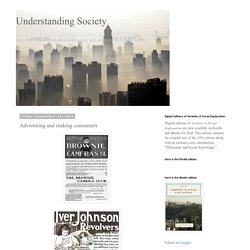
And yet this activity is itself a trillion-dollar industry, and arguably has greater effect on social values and consciousness than religion, politics, or the workplace. Our culture is flooded by marketing messages that surely have a vast cumulative effect on the ways we think about life and the things we value. And this feature of modern social life is radically different from pre-20th century -- village life in France in the 1880s, city life in 17th-century London, or even life in Chicago in 1920.
So it's worth thinking about. The images above come from of a google image search for "advertising 1900". So what factors made advertising a feature of mass society but not the medieval market town? These observations take me in two directions. Consumerism: As a Way of Life - Steven Miles p1/2. Consumer Culture, Identity and Well-Being: p3. Advertising, materialism and consumption are central aspects of contemporary Western culture.
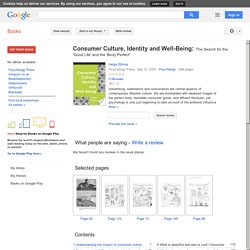
We are bombarded with idealised images of the perfect body, desirable consumer goods, and affluent lifestyles, yet psychology is only just beginning to take account of the profound influence these consumer culture ideals have on individuals’ sense of identity and worth. Consumer Culture, Identity, and Well-Being documents the negative psychological impact consumer culture can have on how individuals view themselves and on their emotional welfare.
Consumerism, 4th Ed. start from p88. David A.
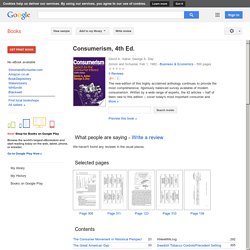
The consumer society and advertising – Andrew McStay. Industrial revolution brought about change so that cheap production meant ordinary people could afford technologically advanced goods like never before.
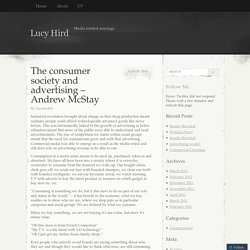
This was intrinsincally linked to the growth of advertising as better education meant that more of the public were able to understand and read advertisements. The rise of competition for status within social groups meant that the need for consumerism grew and with that advertising. Commercial media was able to emerge as a result as the media relied and still does rely on advertising revenue to be able to run.
Consumption in a media sense means to be used up, purchased, taken in and absorbed. MyiLibrary. Nsumerism: With Reference To Selected Home Appliances - V. Seshadri.